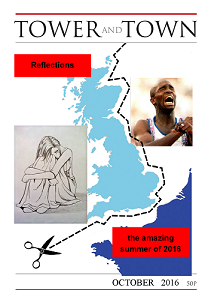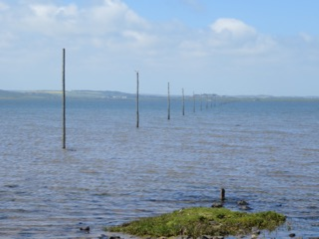

Tower and Town, October 2016 (view the full edition) (view the full edition)Sabbatical ReflectionsEvery seven years the Methodist Church gives its ministers a three month sabbatical. This gift of time is meant to be for study, reflection and refreshment. This year I was due a sabbatical and so decided to spend time looking at how the Celtic practice of Christianity could be both a challenge and an encouragement to us today. I focussed on the 6th - 8th centuries in Northumbria as this was the heyday of the Celtic Church in Britain and included a watershed event in the life of the Christian Church in this country - the Synod of Whitby in 649AD. These are a few reflections on the sabbatical studies. After some general reading the studies proper began with a trip up to Lindisfarne to attend a retreat with teaching on the northern saints, particularly Aidan, Cuthbert and Bede. A later trip to Whitby included a look at Hilda and the all important synod. The Celtic monks were great travellers with a passion for mission and sharing the Gospel. However they also matched their teaching with action and demonstrated the love of God in the practical care of people. There was no discrimination as all who needed received care, whether or not they accepted this new faith that was being taught. There was no separation of Church and politics as many of the Celtic leaders acted as friend and advisors to kings. Education was important and the monasteries would always include a school. Education for girls as well as boys was offered. The basic skills of literacy and numeracy as well as practical skills would enable the children to be well equipped for adult life. The children, boys especially, would learn Latin, the language of books and the Bible. As part of education and mission the translation of parts of scripture into English was begun so that ordinary people could hear and understand God's word. Here is the first English version of the Lord's Prayer translated by Bede, a scholar and historian. Fęder ure žu že eart on heofonum; Si žin nama gehalgod to becume žin rice gewurže šin willa on eoršan swa swa on heofonum. urne gedęghwamlican hlaf syle us todęg and forgyf us ure gyltas swa swa we forgyfaš urum gyltendum and ne gelęd žu us on costnunge ac alys us of yfele sožlice. Another aspect of the Celtic way which is very relevant for our age is a respect for all creation. All life, be it plant, animal or human, was part of God's creation and to be treated with care and respect. Perhaps we need to relearn that lesson as our abuse of the natural world leads us to global warming and to a growing divide between rich and poor across the world. In 649 the Synod of Whitby made the decision that the Church throughout Britain should follow the Roman way and so part of our Christian heritage faded into the background. As this strand of our heritage is rediscovered we do risk romanticising the Celtic Church, but if we can avoid doing so we can embrace that part of our past - because who we are today is rooted in all our past. The sabbatical was interesting and I appreciated the time for study and reflection. If any group, Church or not, would like to hear more I am happy to come and talk about my sabbatical studies.  Heather Cooper |